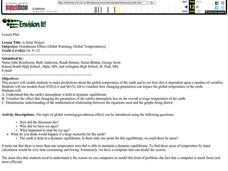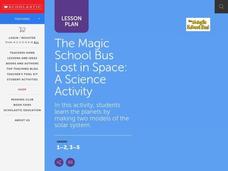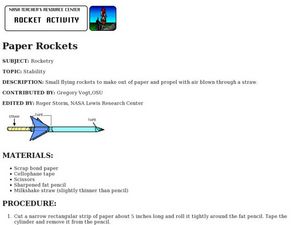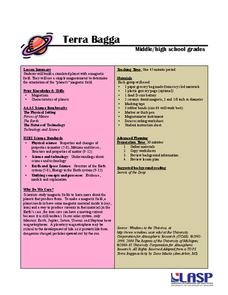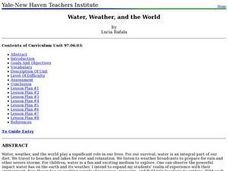Curated OER
A Solar Project
Students make predictions about the global temperature of the earth and to see how this is dependent upon a number of variables. Students visualize how changing parameters can impact the global temperature of the earth.
NASA
Development of a Model: Analyzing Elemental Abundance
How do scientists identify which elements originate from meteorites? Scholars learn about a sample of material found in a remote location, analyzing the sample to determine if it might be from Earth or not. They study elements, isotopes,...
California Academy of Science
Kinesthetic Astronomy: The Meaning of a Year
How many times have you traveled around the sun? Aspiring astronomers grasp what a year is and they differentiate between orbit and rotation by walking around the sun right within your classroom. Place a lamp in the center of the room to...
Curated OER
The Magic School Bus Lost in Space
Students learn along with Ms. Frizzle's class. In this Magic School Bus lesson plan, students explore outer space as they visit the Sun, Mercury, Venus, and Mars in order to learn about our solar system.
Curated OER
Paper Rockets
Students design, construct, and fly paper rockets that travel the greatest distance possible across a floor model of the solar system. They construct small flying rockets out of paper and propel them by blowing air through a straw.
Curated OER
Why Do We Have Night?
Students engage in a fun, creative way to discover how the Earth moves. This lesson helps students explain why there is day and night. It can also create curiosity to further study the solar system and eclipses!
Curated OER
What Makes you Hot?
Learners manipulate different variables in a model and make inferences about the temperature on Earth. In this heat lesson students calculate the blackbody radiation of an object at a certain temperature.
Curated OER
Seasons and Cloud Cover, Are They Related?
Students use NASA satellite data to see cloud cover over Africa. In this seasons lesson plan students access data and import it into Excel.
Curated OER
Junior Solar Sprint Series: Gears and Drive Belts
Activate middle schoolers' minds with this physical science activity. Learners vary the diameter of gears and the number of teeth on them to find how energy output is affected. This writeup features well-developed background...
Curated OER
Electrolysis of Water
Ninth graders examine the electrolysis of water by completing an experiment. In this water lesson plan students will explain how hydrogen can be extracted from water and how energy flows through an electrolysis system.
Curated OER
Discover Magazine: Size and Scale
Young scholars research measurements of the moon and Earth as well as the distance between the two in order to create scale models of the Earth-moon system. With a marble to be used as the moon, they must determine how large to make...
Curated OER
Sweet Candy Comets
Fourth graders use candy to make a comet. In this lesson, 4th graders examine the role comets have played throughout history, students watch NASA videos about comets and complete the lesson by making an edible model of a comet. This...
Curated OER
Cosmic Wheels
Learners build a scale model of the Solar System and determine the time other planets take to travel around the Sun in comparison to the time of the Earth's revolution. The velocity of the planets are also determined in this lesson.
Curated OER
DASH Sunrise and Sunset/ Seasons Chart
Second graders rotate as the person to enter the information of sunrise and sunset into a spreadsheet. The teacher also demonstrates how to convert the spreadsheet into a chart.
University of Colorado
Terra Bagga
One way to identify possible volcanic activity on other planets is by testing the planet for magnetism. A science lesson begins with pupils constructing their own planet from a dead battery, magnets, paper, and tape before labeling...
Curated OER
Comet Encounters
Students create glitter-covered comet models. Then they make large outdoor chalk drawings of the solar system and place their comets at the location of the Kuiper belt. They carry their comets around an orbit of the sun, shaking various...
Curated OER
Water, Weather, and the World
Students in a special education classroom examine the role of weather and water in their lives. Each day, they add a symbol for the weather outside and identify the proper activities for the weather on that day. In groups, they...
Curated OER
Walk a Mile in your Orbit
Students create an awareness of the distance between the planets and the complexity of the solar system through a model of an active solar system. they incorporate physical education and math with the ability to convert distances of each...
Curated OER
Distance in Space
Sixth graders explore space science by measuring distances between planets. For this solar system lesson, 6th graders view a Bill Nye video and discover the conversion between the metric system and imperial measuring systems. Students...
Curated OER
Deep Impact's Comet on a Stick!
Learners create a model of a comet. In this space science lesson, students compare their model to the characteristics of a real comet. They evaluate and make necessary modifications to their original design.
Curated OER
Introduction to the Planets
Students become familiar with the members of the solar system and planetary order. They identify differences and characteristics of individual planets. Finally students visualize the great size of the solar system and make the image more...
Curated OER
Warming the Earth
First graders investigate how the sun warms the Earth and examine the rotation of the Earth and the sun. They create an illustration of the sun, examine a solar system model, and listen to the book "The Sun: Our Nearest Star." They also...
Curated OER
The Moon
Students explore the relationship between the earth, sun, and moon in our solar system. They create a moonrise/moonset chart, perform a dance that models the moon phases, and create a Styrofoam model of the moon's surface.
Curated OER
Glowing Glimpses of Our Universe
Learners will complete hands-on space activities. In this space science lesson, students will create a glow-in-the-dark model of the solar system, visit a planetarium, make star pictures, and paint constellations. Activities are meant to...


